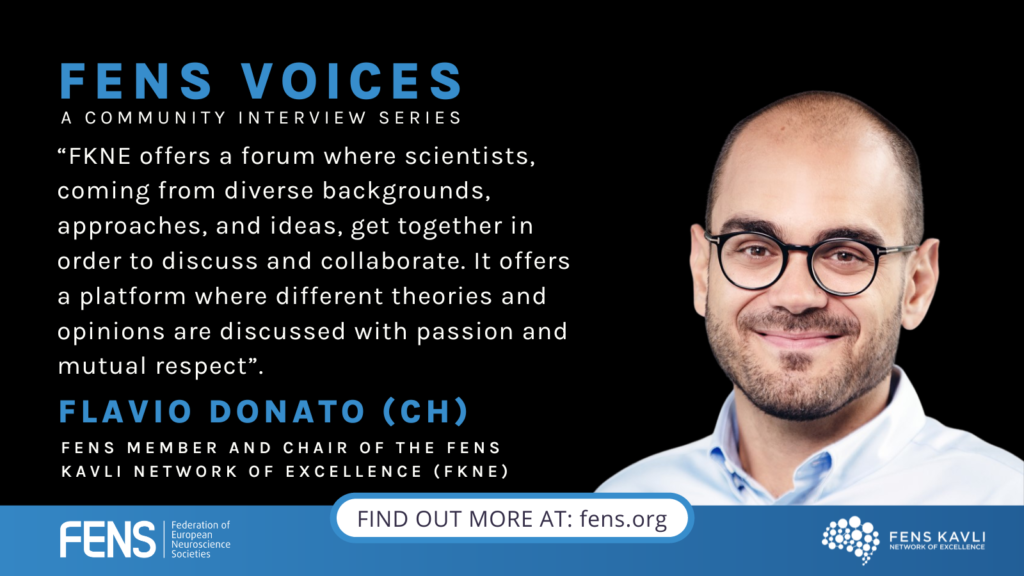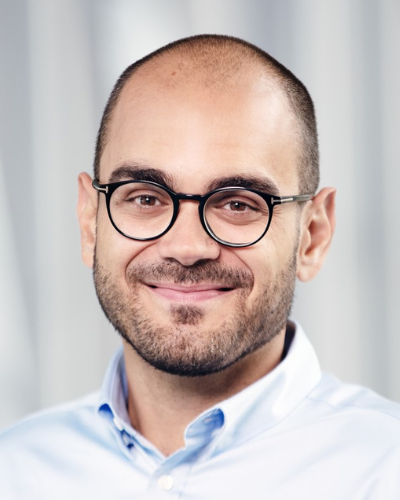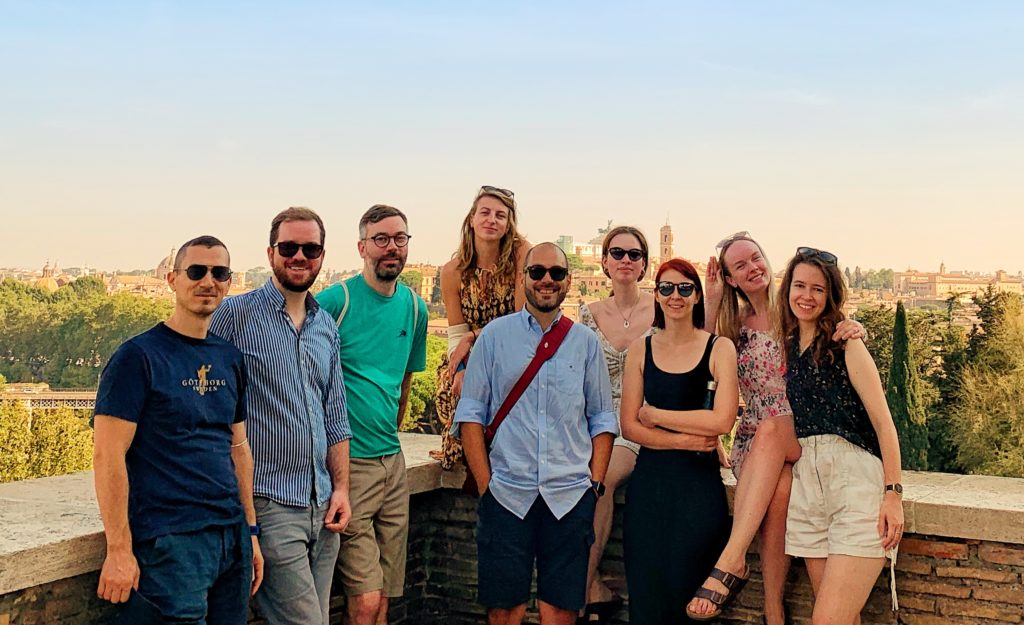
FENS Voices | Flavio Donato: Nothing great has ever been achieved without enthusiasm
20 January 2023
FENS News, Neuroscience News
FENS Voices continues to share community highlights by talking with Dr Flavio Donato, FENS member and Chair of the FENS Kavli Network of Excellence (FKNE). Dr Donato is interested in advocating for neuroscience and support of early and mid-career researchers. His scientific work elucidates the processes that lead to the maturation of the entorhinal-hippocampal network, by showing that stellate cells in the entorhinal cortex provide an activity-dependent signal that drives the maturation of the transverse hippocampal circuit. For this discovery, Flavio was awarded the Eppendorf & Science prize for neurobiology in 2017. Since 2019, Flavio is leading his laboratory at the Biozentrum of the University of Basel, where he investigates the development of neuronal circuits and cognitive functions. Find out more about this stellar scholar below.

What initially attracted you to science?
FD: To be honest, it was curiosity, pure curiosity. As a child I was very curious about how things around me worked, and I spent a lot of time in nature. At the same time, I was attracted by the idea of studying and motivated by an unquenching thirst for knowledge. Where is the line between what we know and what we don’t know? And once we have an idea of where this line is drawn, how can we conquer the unknown? Going to school was satisfying to me, I was learning more and more, which was very exciting. At a certain point the school path ended though, and I had to make a choice regarding what I wanted to do next. To me, gathering knowledge on how nature works was the most exciting thing to pursue at the time, and it has been ever since. So I would say that more than big missions like curing diseases or saving the environment, gathering knowledge about how the world works was the thought that motivated me the most, and science was a very good place to start.
You’ve obtained a bachelor’s and master’s in biotechnology from the University of Rome Sapienza. What made you transition afterwards to neurobiology and how was your experience with biotechnology?
FD: I chose biotechnology because at that time, the advancements of genetic engineering were somehow pervasive. It was the period when the scientific community reached the important milestone of sequencing the human genome, and made the first big step towards cloning animals. It was a very exciting time for studying the genetic basis of life, and for using that knowledge through genetic engineering. In the end though, my curiosity got the best of me and pushed me again towards focusing on the things we don’t know yet. From that point of view, the brain was one of the most fascinating subjects to pursue, both for its complexity and because there is a lot that we really have no idea about. I believe that understanding how we think, how we remember, how we learn things, and how all these efforts impact how we make choices and define our personalities are the next big goals to achieve. At that moment I was thinking: “Ok, I want to do science. I want to do research. What should I focus on?” The brain was maybe one of the most mysterious and hence most fascinating things I could think of and that’s why I moved to neuroscience.
How was your experience in moving from Biotech to neuroscience?
FD: The basics of doing research are the same in every field. You see a phenomenon, you formulate a hypothesis and then test it. In the end it was a very small transition, there wasn’t something that I had to radically change about how I approached doing science. The big transition was actually leaving back the student’s mind-set, and venturing into a world which is completely unknown, where there is no path in sight that could lead you to deciding which road to take. That was something that took me by surprise. You stray away from a path that is being laid in front of you, away from knowledge that you just need to understand and memorise to move to something that is entirely unknown and is up to you to approach. So I think that this is the big step that everyone planning to do research needs to face. Moving beyond what is known and venturing in something that is completely unknown, awaiting to be discovered.
What fascinates you the most when you think about neuroscience? What would you like to understand about the brain?
FD: In studying the brain, we usually think of brain functions as largely belonging to three different categories. There is perception, the function of using our sensory organs to create an internal representation of the world around us. Action is the function of controlling our movements. And in between there is cognition, that includes diverse things like learning, memory, and decision making. This last category is where my passion lies: understanding how large networks of neurons build on information they receive through the senses to create something that goes beyond the physical reality around them, something abstract, like a memory or an emotion. Contributing to understanding how the brain is able to do this would be my greatest ambition.
How are you trying to achieve this?
FD: We know that in the last instance, what we call memories, decisions or emotions, arise from the activity of thousands of neurons using electrical impulses to exchange information with each other. Hence, our experiments boil down to recording the activity of large populations of neurons in the brain while a test subject – in most cases a laboratory animal like a rodent – does something that is meaningful to itself. This implies having the possibility to probe the activity of neurons in specific brain areas while mice and rats are engaged in activities such as making decisions, navigating through a maze, learning to find their way to a goal, and creating memories. Then we can try to understand how this activity might actually contain information on what the animal is doing, the choices that the animal is making, the memories or experiences that the animal has had before in the same context. By correlating the behaviour of the animal with the activity of this population of neurons we record from, we try to understand how information from the world is encoded in the brain, and how its flow through a specific and distributed neuronal network gives rise to said behaviour. In the past 10 years there has been a huge increase in technologies that allow us not only to visualise activity of cells within the brain, but also to manipulate these neurons to causally test if our hypotheses regarding the association between specific neurons or brain areas and cognitive functions are true, which has advanced our understanding of the brain immensely.

In your lab, you and your team study how infant and adult mice navigate through real-world and virtual-reality mazes. Why have you decided to focus on these topics? What would a typical experiment look like?
FD: That’s right, in the lab we are interested in understanding how the brain supports functions like creating memories, navigating through the environment or making decisions, and how the ability to support these complex functions changes during the lifetime.
The reason why we focus on these topics is that we are driven by curiosity: if, as the philosopher John Locke said, our memories are the basis of our personal identities, wouldn’t it be amazing to understand how these are made and guide our actions, and how the experiences we pass through – especially the ones that we have during the first years of our existence – shape who we will become in the future?
That is why we usually train baby and adult mice to learn something, for example navigating through a maze in order to reach for a food they particularly like, such as chocolate cookies or sugar water, or to associate a specific context – say, a room – with something pleasant or unpleasant, while at the same time we look into their brain to record the activity of neurons in areas that play an important role in navigation and relational memory formation like the hippocampus. Which neurons are used by the animal to make a memory? Which are the ones necessary to remember this memory? How do these neurons talk to each other both while the animal is learning and in the hours after, when that memory of that event is consolidated? And if we looked weeks or months after the memory of a particular experience is made, would we find the same neurons being responsible for remembering that memory? These are questions we try to address with our experiments.
So if we stretch your reasoning, your discoveries could suggest interventions that could correct the effects of living through negative experiences, for example trauma?
FD: We’re not necessarily studying that, in the sense that what we study is the fundamental phenomenon of how memories are made and guide our actions. We’re not focused on the applications of actually overcoming trauma, but at the same time, if trauma is the result of an experience that brings some long-lasting consequences, its effect might be shaped by the way we remember. So, understanding how memories are built to begin with, might actually help us to control the over- activation of a specific memory of a traumatic event, which might be at the basis of conditions like post-traumatic stress disorders. We are far from that, but the fact that in the scientific community many laboratories are now working on these topics with a clear translational goal in mind makes me optimistic that we might, in the not too distant future, provide suggestions on interventions to treat trauma. In the end, though, we should never forget that basic science, that is science which has the pure aim of understanding how things work, is the basis on which any application is built. Including correcting trauma.
You are the current chair of the FENS-Kavli Network of Excellence (FKNE). Can you briefly describe what this group is, and what its goals are?
FD: FKNE is a network that brings together 30 early to mid-career European neuroscientists for a period of 4 years (half of the network rotates on a regular basis, every two years). Its aims are to promote scientific exchange among its scholars and alumni, improve neuroscience in Europe and beyond, provide opportunities for early-career scientists, influence science policy and facilitate interaction between science and society. The network was established in 2014 through a collaboration between the Federation of European Neuroscience Societies (FENS) and The Kavli Foundation, and has grown considerably ever since.
Why did you join FKNE?
FD: I joined because I wanted to find a community of people that share my passion for science, are willing to collaborate to reach new depths in our understanding of the inner workings of the brain and are happy to invest time and energy towards shaping the social and legislative landscapes, where science will be conducted in the future. In this day and age, being a neuroscientist is an exhilarating experience. Thanks to a series of technological breakthroughs, from the development of new methods of recording and manipulating the activity of an ever-increasing number of neurons simultaneously, to the mapping of the connectome of entire brains (at least for some model organism), to the application of more and more sophisticated theoretical frameworks to model brain functions, we have now the possibility to ask deeper questions about the brain. But opportunities like these also present us with challenges: more and more often, advancing science requires a mix of different backgrounds and expertise, which can’t possibly be all found in one person. In my opinion, in the future, scientific progress is going to be relying mostly on collaborative efforts, where each participant contributes with a different perspective to arrive at a holistic understanding of a phenomenon. FKNE offers a forum where like-minded scientists, coming from diverse backgrounds, approaches, and ideas, get together in order to discuss and collaborate. But most of all, it offers a platform where different theories and opinions are discussed with passion and mutual respect. I always leave one of our meetings with my batteries recharged, full of enthusiasm, ready to embark in new experiments and develop new ideas with my fellow scholars.
What could FKNE still do to amplify the voice of early-career researchers?
FD: There are many areas where FENS-Kavli can make a difference, from advancing common positions on issues like diversity and inclusion, mentorship and training, dissemination of scientific findings, to the evaluation of researchers and scientific conduct. We recently discussed how to use European-wide organisations such as FKNE to support cohesion among countries on scientific matters. Even though some entities try to level the support given to early-career scientists across Europe, we still see many differences in the way science is considered and supported at national levels. One of the goals of FKNE is to bring together scientists from as many different countries in Europe as possible, allowing them to share their own experience of what it means to manage a research group in the background of diverse political and cultural environments. We hope that these exchanges allow us to identify what works and what needs to be improved in the way research is supported across the continent, and then possibly go back to our institutions with concrete positive examples on how we can improve policies for early-career scientists. Moreover, with the support of established organisations, and FENS is on the forefront in this, we are trying to develop the network into a training ground for the future generation of Neuro-Advocates, to create a bridge between the scientific community and the European political establishment in order to advocate for more substantial economic and political support for neuroscientists.
But we are aware that progress does not come by default, and that it requires hard work. I believe that the major strength of FKNE is bringing together people who want to shape the future through their actions. After all, FKNE’s power is determined by our and our colleagues’ willingness to engage.
These days, the network is launching a new call for applications to select the new cohort of Scholars. As the chair of the Selection Committee, what are you looking for in an ideal candidate?
FD: We are looking for passionate neuroscientists that are at the beginning of their careers, and are willing to dedicate their time and mental power to make Europe an even more attractive and ideal place to do science. As the name implies, we hope to select scholars that are outstanding in their field, though realistically we cannot – unfortunately! – expect to include all the excellent early-career neuroscientists that are scattered all across Europe. There are so many brilliant minds out there that sometimes I wonder why I was selected by the previous selection committee. Jokes aside, we are looking for people that have daring and ambitious ideas on what brain-related questions should be raised in the future, and a strong drive to collaborate with their peers, so that we can reach new depths of knowledge. There are no prerequisites regarding the applicant’s age or previous achievements: each case will be discussed independently, and many factors will contribute to the overall positive impression. We are going to pay particular attention to selecting a cohort that can best express the diversity of approaches, backgrounds, experiences, ethnicities and geographical distribution of neuroscience in Europe, so I would strongly encourage whomever realises that their nation or background (scientific or otherwise) has been underrepresented in FKNE in the past to apply this round.
Given that most researchers are extremely busy with their own work, why should an early-career neuroscientist apply to become a FKNE Scholar?
FD: I firmly believe that there is strength in cohesion and that strength comes from unity. In many cases, even though I have known these FKNE lunatics for almost a year, we have managed to create an intellectual connection that thrives on our mutual love for research, and whose depth I had experienced only a few times before. And talking with many FKNE alumni, this seems to be the rule more than the exception. It takes a lot of work to make the difference, especially today, in a time when the resources are scarce and the competition is fierce. Sharing that burden and supporting each other can only play at our advantage.
Any advice for a successful application?
FD: I still remember the advice that my English teacher gave me when I finished high school: “nothing great has ever been achieved without enthusiasm”. So, I suggest letting one’s passion shine through their words, and let our shared love for science do the rest.
About the FENS-Kavli Network of Excellence
The FENS-Kavli Network of Excellence (FKNE) is composed of junior and mid-career neuroscientists representing most European countries in a joint effort to shape the future of neuroscience by putting young researchers in the driving seat. It consists of 30 Scholars; they serve two terms of 2 years (4 years in total). Every two years up to 15 new Scholars are selected, and 15 end their mandate/rotate off, becoming FKNE Alumni.
The call for 2023-2027 FENS-Kavli Scholars is now open!
About the Federation of European Neuroscience Societies (FENS)
Founded in 1998, the Federation of European Neuroscience Societies is the main organisation for neuroscience in Europe. It currently represents 44 national and single-discipline neuroscience societies across 33 European countries and more than 22,000 member scientists. Discover FENS and subscribe to our biweekly News Alert, with information on our latest calls and activities.